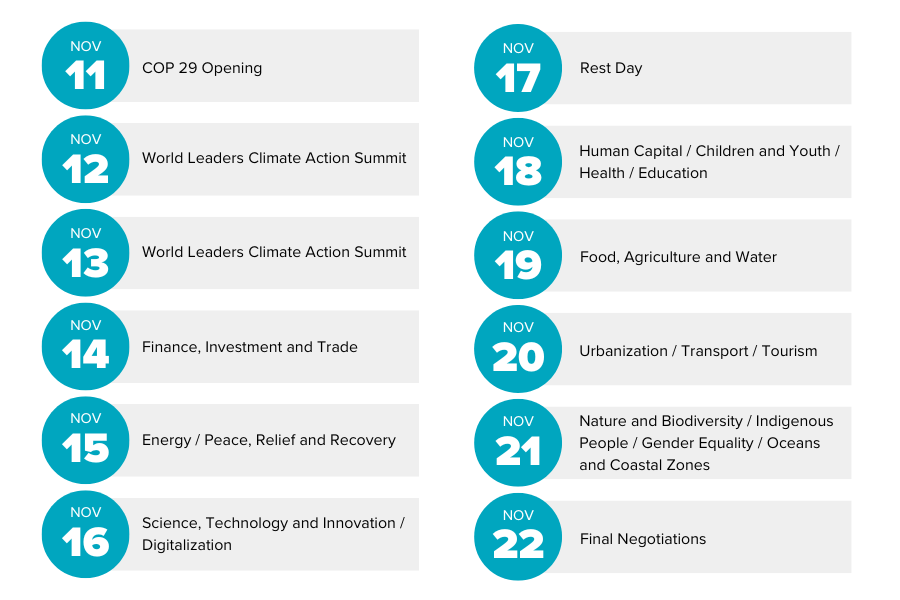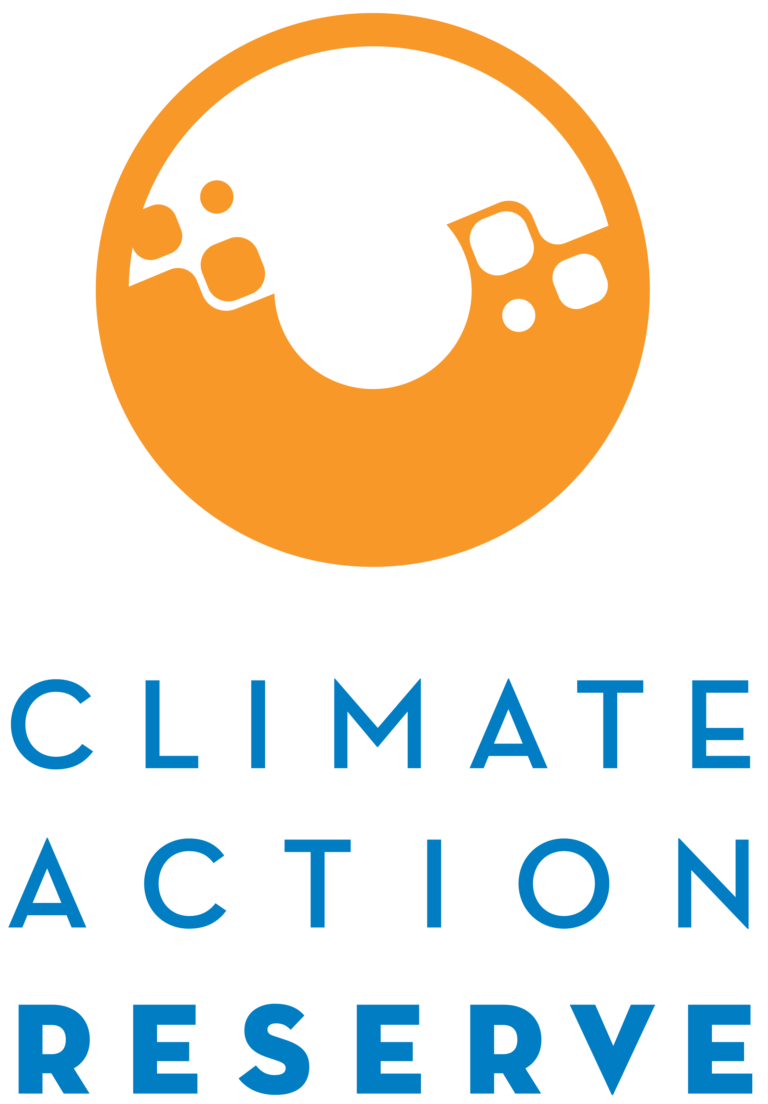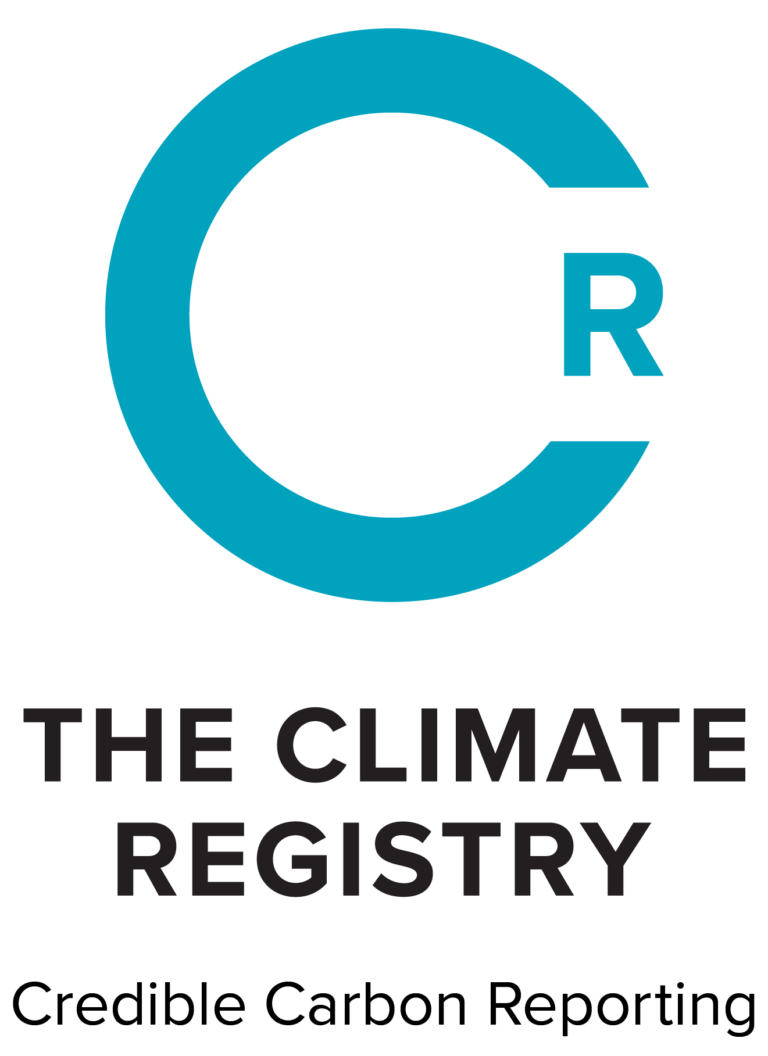COP 29 Frequently Asked Questions
We’ve assembled a list of some most frequently asked questions and their answers to help you get all the information you need. We encourage you to check this page periodically, as we will add new information as it becomes available.
If you do not see the question you are looking for on this list, please refer to the UNFCCC website and/or the COP 29 website.
Please also review the Observer Handbook for COP29, which provides essential information on how to engage effectively and meaningfully in the UNFCCC process.
What is COP?
The Conference of the Parties (COP) to the United Nations Framework Convention on Climate Change (UNFCCC) is an international climate summit held annually since its inception in 1995. At COPs, world leaders gather to collaborate on climate solutions, determine ambition and responsibilities, and identify and assess climate measures.
The 29th session of the COP (COP 29) will be a litmus test for the Paris Agreement and global climate action and cooperation. It will be a milestone moment for the world to come together, course correct, and address all of the most fundamental and pressing issues in the fight against climate change, with a new collective quantified goal (NCQG) as a focal point.
As climate action has gained prominence globally, attendance at COPs has surged, as exemplified by COP 28, which attracted over 85,000 participants.
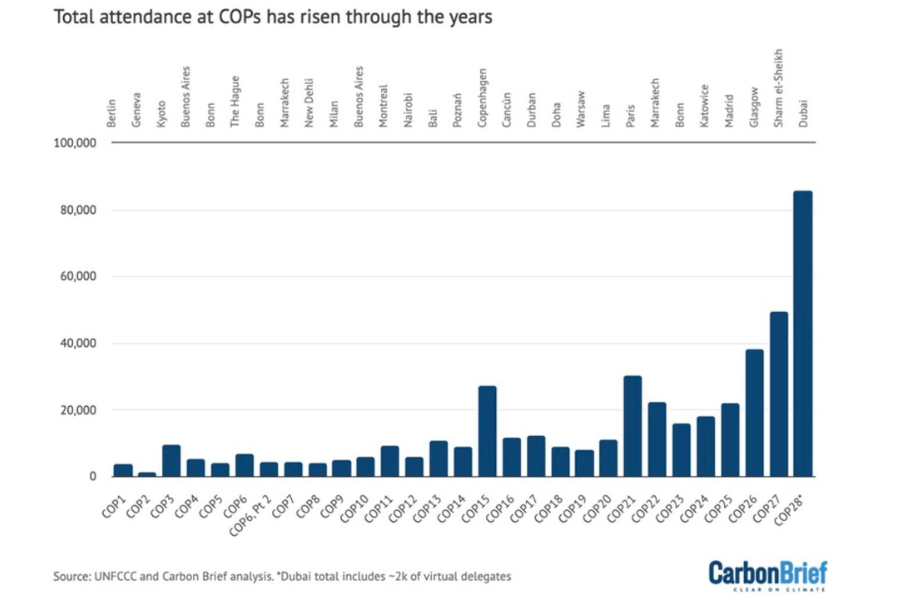
Where will COP 29 be held?
COP 29 will be held in Baku, Azerbaijan at Baku Stadium.
When is COP 29?
November 11 – 22, 2024
What is the vision of this year’s COP?
There are two pillars of the COP 29 vision: Enhance Ambition and Enable Action.
- Enhancing Ambition: Nationally Determined Contributions (NDCs) and Mitigation
Involves establishing plans to stay below 1.5°C and “leave no one behind” in order to meet the goals and principles of the Paris Agreement. The primary components of Enhancing Ambition will be to finalize and operationalize Article 6, and make it so that Parties act with comprehensive and robust Nationally Determined Contributions (NDC), National Adaptation Plans, and Biennial Transparency Reports.
- Enabling Action: Finance and The New Collective Quantified Goal on Climate Finance (NCQG)
Involves establishing the means of implementation – finance, technology, and capacity building – and the wider enabling conditions at global, regional, national and subnational levels. One of the top priorities of COP 29 will be to agree on a new collective quantified goal (NCQG) on climate finance, taking into account the needs of developing countries.
Full details about the priorities and vision of COP 29 can be found here.
Is a visa required to attend COP 29?
Yes, the Azerbaijan Government has authorized an electronic, free-of-charge “COP 29 Special Visa”, which will be required for all COP 29 registered participants traveling from outside Azerbaijan.
You may apply for the COP 29 Special Visa after receiving approval of registration via the UNFCCC Online Registration System. Approved participants will receive a link to apply for the visa within their registration confirmation email.
- The COP 29 Special Visa allows the holder a single-entry visit.
- All foreign participants attending COP 29 must have a passport valid for at least three months from the date of entry into Azerbaijan.
For more information about the visa, please visit the COP 29 website.
What transportation options will be available?
In Baku, the state-owned Baku Taxi Service has a fleet of taxi cabs that are metered. Note that while Uber is available, expats must download and use a specific Uber Azerbaijan app. Bolt also is a ride service available through an app.
Will my devices and chargers work with the hotel outlets?
In Azerbaijan, they use power sockets (outlets) of type C and F. In the United States, you have plugs A and B. You need a power plug adapter in Azerbaijan for sockets type C and F.
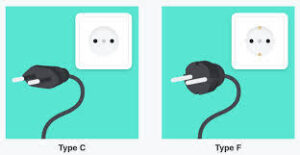
What is the Blue Zone?
COP is split into two parts: the Blue Zone and the Green Zone. The Blue Zone is a UNFCCC-managed site, open to accredited party and observer delegates. It hosts the formal negotiations across the two weeks of the event, as well as the World Climate Action Summit, the country pavilions, presidency events and hundreds of side events including panel discussions, round tables, and cultural events. The Blue Zone is attended by:
- Parties (Heads of State, Ministers, Negotiators)
- Observers (NGOs, IGOs, UN Agencies)
- Media
- World Leaders
What is the Green Zone?
The Green Zone is managed by the COP 29 Presidency and is a platform for the general public, youth groups, civil society, indigenous groups and the private sector to have their voices heard, promoting dialogue, awareness and commitments about climate action.
Learn more about the Green Zone on the COP 29 website.
What are the COP 29 thematic days?
